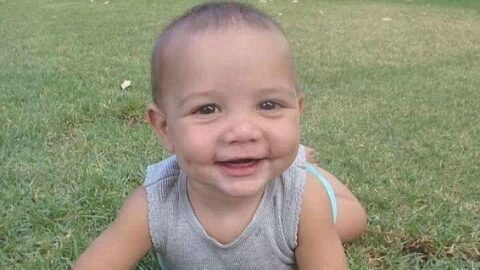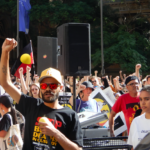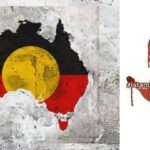After WA’s Historic Pardons, Further Police Accountability Is Needed for Baby Charlie

WA attorney general John Quigley this week apologised for the treatment the state and WA police subjected Tamica and Ted Mullaley to in relation to the circumstances surrounding the 2013 murder of 10-month-old baby Charlie. The minister also pardoned the pair of their related convictions.
Tamica was brutally attacked by then partner Mervyn Bell on a street in Broome on 19 March 2013.
On attending, WA police found the 26-year-old Yamatji mother-of-two lying naked on the ground, severely wounded and wrapped in a sheet, yet officers proceeded to treat her as being in the wrong.
As Ted arrived, he found his distraught injured daughter surrounded by police and holding onto Baby Charlie, who’d been brought to the scene. He tried to deescalate the situation but was arrested along with his daughter, although he did manage to convince officers to take her to the hospital first.
Ted informed police that Bell was the attacker and of his whereabouts. Yet, they ignored this, taking the pair into custody. Officers denied a request to take Charlie with them and failed to give adequate attention to the baby’s welfare. Then, Bell turned up, kidnapped the child and tortured him to death.
The Mullaleys welcome Wednesday’s apology, but made clear it’s not enough, as systemic racism remains. Indeed, not only does this case reflect police racism against First Nations in general but, in particular, the criminalisation of Aboriginal women who’ve been subjected to domestic violence.
An apology long time coming
“Being apologised to means a lot. The apology was good to hear from the whole of government and the police for the way they treated dad with racism, and the way they treated us generally over that night and the week after,” Tamica told reporters on Wednesday, following the apology.
“You can tell in someone’s voice if they mean something, and now they’ve actually heard the truth of what happened nine years ago, it’s touched them,” she added. “Sorry means a lot… as an Aboriginal family, a family and a mother.”
In fielding questions, the Yamatji woman stressed that while the apology was a long time coming – a nine year wait – at that moment she was just glad that the admission had arrived. And in terms of what fuelled the behaviour that saw a victim treated as the criminal she said, “It was just racism”.
Outside WA parliament, Ted explained to reporters that when he approached his daughter on the night, he was told to go home, but he’s glad he didn’t. After arriving at the hospital, it became clear that the assault was so vicious that Tamica had a lacerated spleen and a ruptured kidney.
“The policeman had his hand on her back, holding her down, twisting her arm up,” Baby Charlie’s grandfather recalled. Ted’s sister then stepped in adding that she couldn’t believe that in the days following the death, the police repeatedly drove by the family home, harassing and taunting them.
An historic pardon
The WA attorney general delivered the apology in parliament on 22 June, outlining that Tamica and Ted “have endured the unthinkable”. He explained that despite a request to take Charlie with them, the baby was left with family friends, and the pair were subsequently charged.
Tamica was convicted on two counts of assaulting police and one of obstructing them, while Ted was convicted on a charge of obstructing police. On sentencing Tamica in 2015, Magistrate Stephen Sharratt was sympathetic to her plight and handed down a one-year suspended sentence.
Quigley outlined that a 2016 WA Corruption and Crime Commission review found that officers hadn’t treated Tamica like a victim of crime. And he added that the governor of WA had “exercised the royal prerogative of mercy so as to grant free, absolute and unconditional pardons to the pair”.
A governor normally only issues a pardon when the attorney general is satisfied that the convicted person is both morally and technically innocent of the crime to which the pardon has been sought.
This is not the end of the matter
National Justice Project principal solicitor George Newhouse outlined that the pardon marked an historic event as it was the first time in WA history one had been issued. But he underscored that it’s not enough and the family will be seeking further accountability to prevent others being at risk.
“There is a sense of catharsis in the family finally getting acknowledged, heard and listened to by people in authority,” Newhouse told Sydney Criminal Lawyers. “However, there’s still much more that needs to be done to change police culture and ensure this never happens again.”
“It’s not sufficient because the family want to see change in WA, so police don’t conduct themselves in this way, and that no other family has to suffer this inhumane treatment again,” he explained. “They want an independent investigation of police complaints, not police investigating police.”
Issues that the family want raised are that police failed to adequately consider the baby, officers were insensitive in telling Tamica her child had died, and while the coroner undertook an inquiry into Bell’s alleged suicide in prison after a murder conviction, it refused an inquest into the baby’s death.

Latent in the system
“The police ended up hassling a seriously injured woman who was the victim of a beastly attack,” said Newhouse. “It was obvious that she needed care and not criminalisation.”
Ted Mullaley has suggested that if the assault had happened at Cable Beach – a white suburb in Broome – Baby Charlie would still be alive.
WA police is notorious for its mistreatment of First Nations people. This includes numerous instances where law enforcement has been called in to deal with a domestic violence incident, yet the attending officers end up arresting the Aboriginal woman who’s actually the victim of the attack.
Ms Dhu died in the South Headland police lockup in August 2014 due to the severe mistreatment officers subjected her to. The 22-year-old Yamatji woman had called police about a domestic violence incident but was then taken into custody by officers due to her outstanding fines.
However, the issue that sees police responding to domestic violence incidents that involve First Nations women as the victim and subsequently arresting them as they misidentify the primary aggressor or they take her into custody over other outstanding matters is a nationwide problem.
“This case shows the worst of the criminal justice system in WA,” Newhouse said in conclusion. “If police had treated Tamica and Ted with compassion and care instead of criminalising the victim of an extremely violent attack, it’s likely that Baby Charlie would be alive today.”








